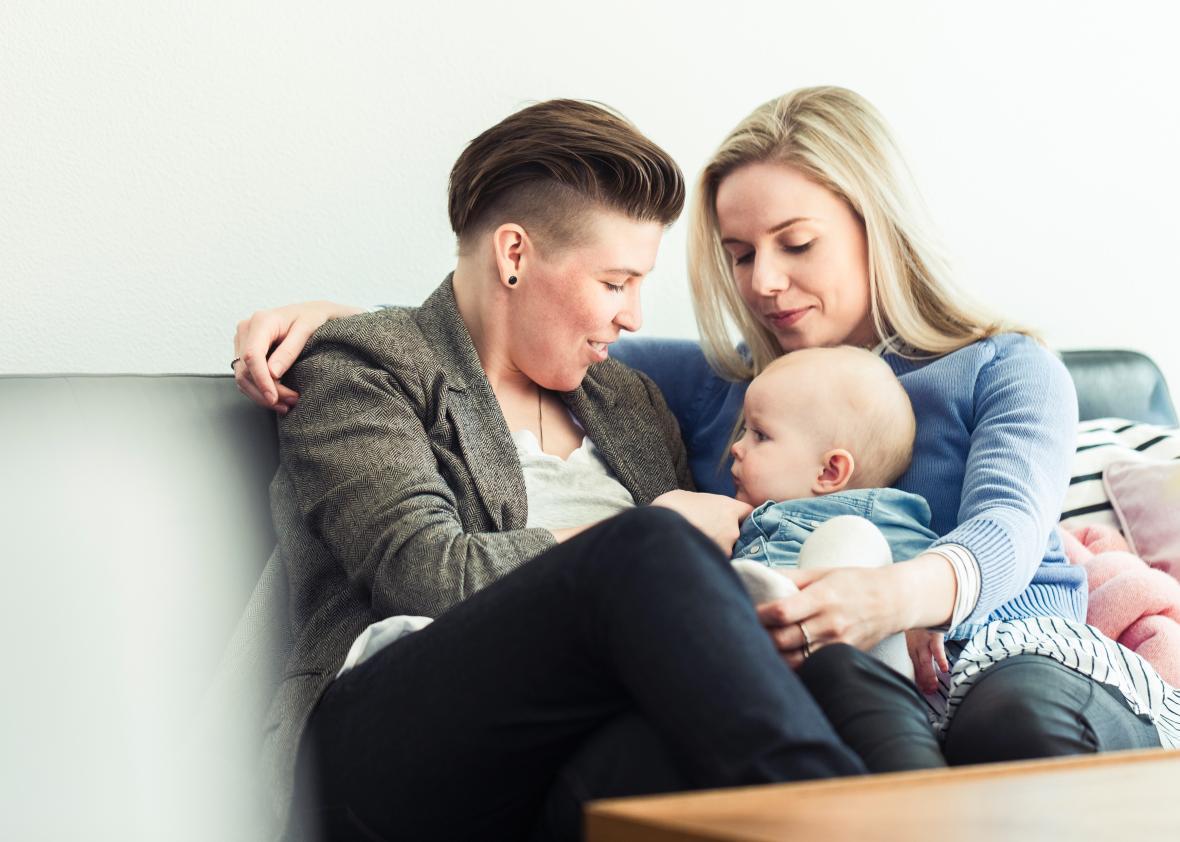For the third time in recent months, a state high court took aim at same-sex couples’ marriage rights, even after the U.S. Supreme Court ruled for same-sex marriage nationwide in 2015’s Obergefell v. Hodges. This time, the Arkansas Supreme Court upheld a state law that strips married same-sex couples of their right to be named by default as parents on their children’s birth certificates.
The majority in Smith v. Paven determined that the state’s preferential treatment of opposite-sex couples was not an undermining of marriage rights but an “acknowledge[ment of] basic biological truths.” The majority astoundingly—and incorrectly—asserted that Arkansas law does not discriminate on the basis of sexual orientation. A basic understanding of family law reveals that, contrary to the justices’ conclusion, something more sinister is afoot.
Under Arkansas law, a woman who gives birth to a child is deemed the mother on the birth certificate. If the birth mother is married to a man at either the time the child was conceived or between conception and birth, her husband’s name is placed on the child’s birth certificate. However, the presumption of parentage does not necessarily mean he is the biological father. Indeed, presumptive paternity does not require any evidence that the husband is the biological father.
As the Arkansas Supreme Court pointed out in a 2001 case, “[T]he strong presumption of the legitimacy of a child born of marriage continues to be one of the most powerful presumptions in Arkansas law.” The presumption has been justified, rightly or wrongly, as advancing children’s best interests, keeping children off public assistance, and promoting model families. The idea behind presumptive legitimacy, one of family law’s bedrock doctrines, is by no means purely about “biological truths” as the Arkansas Supreme Court purported yesterday.
Of course, a woman who naturally conceives a child with her husband does not neatly map onto the experience of most lesbian couples who decide to have children together. However, take the example of a married lesbian couple and a married opposite-sex couple that avail themselves of a donor and artificial insemination services. If the husband in the opposite-sex marriage consents to the artificial insemination, the birth certificate names him and the birth mother as the child’s parents.
But the married lesbian couple that uses a donor’s services in the exact same manner as the opposite-sex couple is at the receiving end of the law’s cold shoulder. Unlike similarly situated heterosexual couples, same-sex couples must obtain a court order to amend a birth certificate.
Cheryl Maples, the attorney for the Arkansas same-sex couples, ably described the heart of the problem when she said, “There’s no requirement that DNA be given or that there be a biological relationship to a child to get on a birth certificate for a father, for the non-birth parent. All you have to do is legitimize the child, and you’re entitled, if you’re heterosexual. This is wrong.”
The court’s majority utterly failed to understand the constitutional issues at stake, reasoning that the Supreme Court’s same-sex marriage ruling in Obergefell was inapplicable because the right to be named as a parent on a child’s birth certificate is not a benefit of marriage. This twisted logic feels strikingly disingenuous. Arkansas law treats one class of married persons differently than another. Call it sex-based discrimination or sexual orientation discrimination; either way, Arkansas law impermissibly isolates same-sex couples for disparate treatment.
The controversy over equal marriage rights and equal treatment concerning birth certificates is not new. In March 2016, federal Judge Robert Hinkle slammed Florida officials for dragging their feet on compliance with Obergefell. Obergefell’s mandate was clear: States cannot “exclude same-sex couples from civil marriage on the same terms and conditions as opposite-sex couples.” This undoubtedly includes marital presumptions on birth records. Hinkle minced no words and ordered Florida to treat same-sex couples equally when listing parents on birth certificates. Florida began recognizing same-sex spouses on birth certificates in May 2016.
The Arkansas ruling stands in stark contrast to the Iowa Supreme Court’s 2013 decision in Gartner v. Newton. There, the Iowa justices unanimously ruled that there is no substantial government interest in favoring biological relationships when naming parents on a birth certificate. Crucially, the Iowa court noted that discriminating against married lesbian couples succeeded only in stigmatizing their relationships: “It is important for our laws to recognize that married lesbian couples who have children enjoy the same benefits and burdens as married opposite-sex couples who have children. … [T]he only explanation for not listing the nonbirthing lesbian spouse on the birth certificate is stereotype or prejudice.”
Unfortunately, this is not the first time state courts have rebuffed same-sex couples who asserted their rights in the wake of Obergefell. Earlier this year, the Michigan Supreme Court refused to hear a case concerning the parental rights of same-sex couples who could not marry or adopt before Obergefell. Last year, the Alabama Supreme Court attempted to undermine Obergefell by refusing to recognize a lesbian couple’s Georgia adoption. The U.S. Supreme Court summarily reversed the Alabama Supreme Court’s shameful ruling with harsh rebuke. Yesterday’s decision by the Arkansas Supreme Court deserves the same fate.
